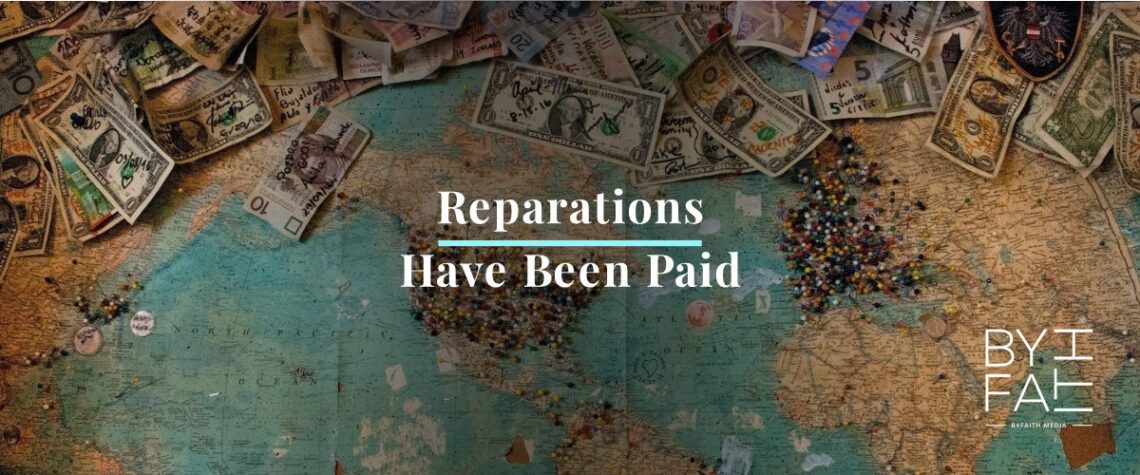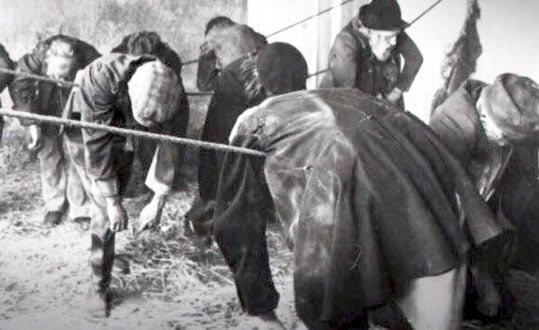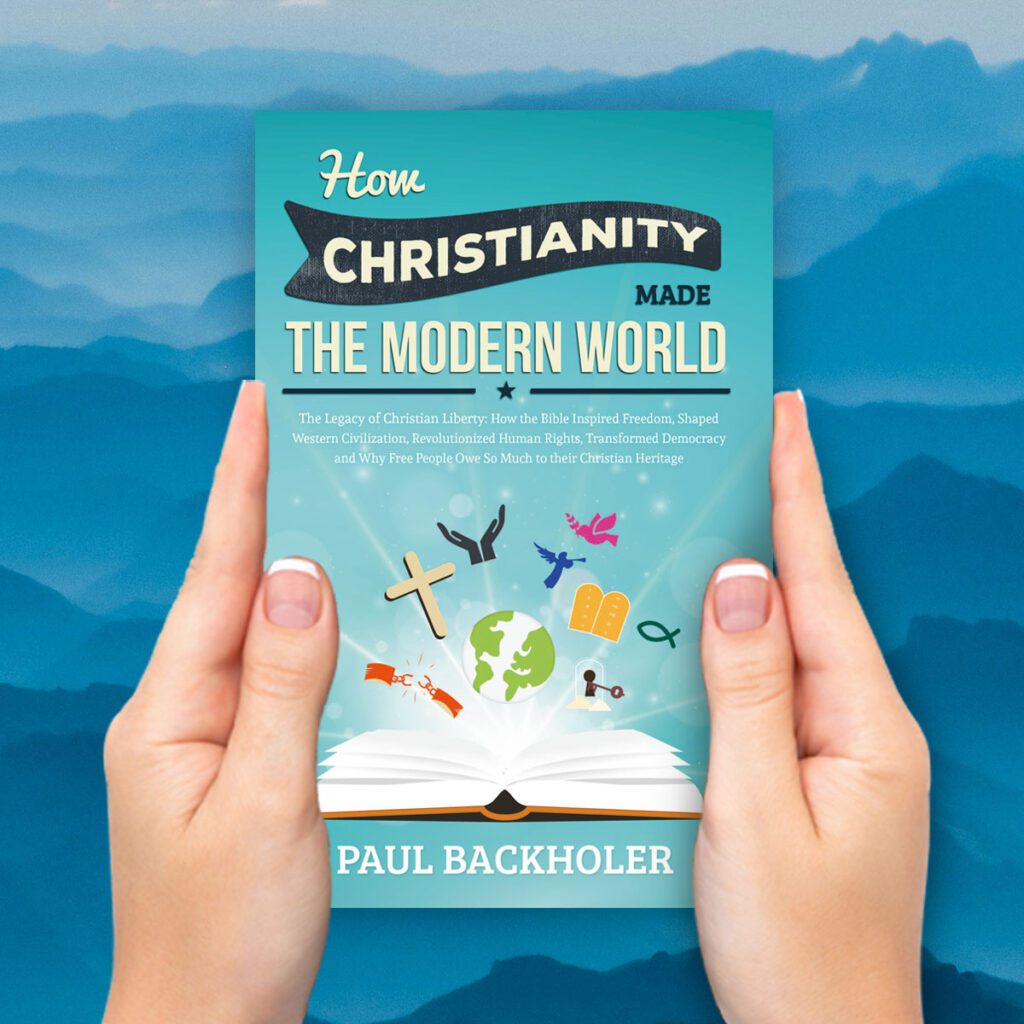
Reparations Have Been Paid For Slavery
The Reparations Myth Debunked: Slavery’s Debt, Already Paid
Western taxpayers have already paid huge reparations for the historical crime of slavery. However, this fact is often overlooked by the media, academia, activists and the elite. As an example, Britain not only apologised for slavery several times (the first in 1840 and the last in 2007), they also spent hundreds of billions (adjusted for inflation) to free the enslaved, capture slave ships, destroy slave ports and infrastructure, and fought to end the institution of slavery. William Wilberforce spent decades fighting to make the slave trade and slavery illegal, leading to the 1807 Slave Trade Act and the Slavery Abolition Act of 1833.
God Almighty has set before me two great objects: the suppression of the slave trade and the reformation of manners
– William Wilberforce
Rethinking Reparations, Historical Accuracy vs. Modern Grievances
The West has also paid trillions to develop destitute nations. The United States is the world’s largest donor of foreign aid, which typically ranges between $40 billion and $70 billion annually. From 1946 to 2022, the United States has paid $5.776 trillion in foreign aid. This article will therefore examine how Western working-class individuals have paid reparations and question why there has been no acknowledgment of their historical exploitation.
In 1833, Britain used 40% of its national budget to buy freedom for all slaves in the Empire. Britain borrowed such a large sum of money for the Slavery Abolition Act that it wasn’t paid off until 2014. This means that living British citizens helped pay for the ending of the slave trade with their taxes
– UK Government, HM Treasury, 31 January 2018

The working poor in the West were subjected to harsh conditions, poor treatment and a lack of basic necessities. They were viewed with disdain and did not benefit from systemic advantages or societal support. Their experiences highlight the stark reality of inequality and the absence of privilege for those on the margins of society. As an example, Victorian London was home to a staggering 30,000 homeless children.
Trillions of dollars have been paid in development aid and billions were spent liberating slaves and abolishing the global slave network. Meanwhile, African and Arab leaders resisted the abolishing of slavery
Should Everyone Get Reparations in this One-Sided Argument!
To begin with, those calling for more reparations are ignoring the suffering of native-born Westerners who have been subject to misery for generations. The plight of Western working people, crippled by the harsh realities of workhouses, the grim conditions of industrial factories, the threat of debtors’ prison, the despair of Dickensian poverty, the exploitation of child labour, the squalor of slum dwellings, the ravages of disease, the hardship of impoverished farm labourers, the dangers of mining, the exile of convicts to distant penal colonies, the perilous work of chimney sweeps, and the senseless loss of life in wars waged by the ruling class, is ignored. Most had little or no democratic voice and were often paid meagre wages, and sometimes even in tokens that could not be spent outside the immediate area.
It’s perverse that in a world still marked by slavery, the elite focus solely on the Christian nations that led the abolitionist movement, while glorifying those nations that fought to maintain the institution of slavery
Did Starving Britons, Executed for Theft of Food, Know Privilege?
In the era of the horror of the Transatlantic slave trade, Britain’s justice system was notoriously cruel and bitter. Over 200 offences, from minor theft to property damage, carried the death penalty. Starving Britons were executed for stealing food, while tens of thousands, including young children, were exiled to Australia’s penal colonies for petty crimes. Given this history, the question arises: Will the elite ever acknowledge and pay reparations to the working class?
Why are there no debates about reparations for the suffering of native-born Westerns who suffered under cruel policies?
Between 1788 and 1868, approximately 162,000 people were transported from the British Isles to the penal colonies in Australia. One of the youngest convicts transported was Mary Wade, who was just 11 years old when she was sent to the penal colony. She was convicted of theft and assault. Historians now regard a substantial number of these ‘criminals’ as little more than starving shoplifters.
Everyone is the descendant of a slave and an enslaver in history, the question is how far do you need to go back to find them
Millions of Forgotten Western Serf-Slaves
A serf was the majority in the West, a member of a low social class in medieval Europe who was bound to the land and subject to the will of the lord who owned that land. Serfs were not identified as slaves, but they were not free. They were considered part of the land and could not leave without permission. By definition of the experience, they were slaves. Here are some of the key characteristics of serfs:
- Bound to the land: Serfs were tied to the land they worked and could not leave without their lord’s permission.
- Obliged to work: Serfs were required to work on their lord’s land for a certain number of days each week.
- Subject to the lord’s authority: Serfs were under the control of their lord and had to obey his rules and laws.
- Limited rights: Serfs had few rights and were often subject to harsh treatment.
- Could not own property: Serfs could not own land or other property.
Despite their low status, serfs played an important role in medieval society. They provided the labour needed to farm the land and produce food. They also helped to maintain the infrastructure of the manor, such as roads and bridges. Serfdom began to decline in Western Europe during the late Middle Ages and early modern period. However, it persisted in Eastern Europe until the 19th century.
Britons Killed for Being the Obedient Poor by Rich Fools
In 1916, on the first day at the Battle of the Somme 57,000 British soldiers were killed, often because they were told to run towards machine guns or they would be shot for cowardice. Should all their families be paid reparations too?
No one alive was a slave or a slaveholder. We were born into this world with its history and the deep-past is not the fault of anyone living
Working and Middle-Class Britons Boycotted Slavery Products
Most Britons never benefited from slavery personally, as this wealth was concentrated at the top 1% who possessed vast estates. These estates also oppressed the working class. However, poor Britons did what they could to end the abuse of slavery.
Despite hardship, working-class Britons gave up their little pleasures to abolish slavery
William Wilberforce visited churches across Britain explaining that the sugar Britons consumed came from the bitter plantations in the West Indies. Moved by his words and their faith in Christ, citizens participated in sugar boycotts as a form of protest. They refused to purchase sugar produced by enslaved labour, aiming to financially cripple the industry and pressure the British government to abolish slavery.
From the depths of poverty, Britons rose to end the chains of slavery
These boycotts contributed to the growing public awareness and pressure that ultimately led to the abolition of the slave trade in 1807 and the Slavery Abolition Act of 1833. Furthermore, the working classes paid their taxes to support the role of the Royal Navy to abolish slavery worldwide and they gave to missionaries, who advocated a transformation of heart, which contributed to the freeing of slaves and the abolition of slavery.
Fight Over The Past or Build the Future?
The West is busy building the future, instead of moaning about the past. While acknowledging the historical injustices faced by the British working poor, the practical and ethical challenges of reparations make it a complex and divisive issue. Pinpointing specific beneficiaries and culprits across generations is impossible, quantifying historical suffering is subjective and the economic cost of reparations is impossible to document. Therefore, instead of focusing on historical grievances, the West has created a more effective approach – to address present-day inequalities and build the future.
The Bible’s teaching is clear on the subject of reparations: we cannot be held accountable for the mistakes of our ancestors
The British, American and European nations, unlike those who perpetuate a victim mentality, are oriented towards the future. Our Christian tradition, which extols the virtues of forgiveness and hope, has fostered a culture that seeks to learn from the past rather than be defined by it. We focus on building a better future and this is the reason we don’t ask for reparations for the sins against native-born Westerners. The Bible laid a foundation that one generation cannot be punished for the sins of another.
A son will not be punished for his father’s sins
– Ezekiel 18:20

Apologies, Reparations and Repentance
Britain apologised for slavery in 1840 and many times over, but no apology has been made by Muslim nations for taking 20 million African slaves, nor by Turkey, for taking 7 million white slaves during the Ottoman Period. Also, there is no African apology to all descendants of former slaves, for profiting from their suffering. Nor has there been any official recognition that every country, empire and region engaged in slavery worldwide.
- Britain’s Prince Albert apologised for slavery in 1840
- Britain’s Prime Minister Tony Blair apologised for its slavery role in 2007
- The US Senate apologised for the ’injustice, cruelty, brutality and inhumanity of slavery’ in 2009
- The European Union apologised for ’the untold suffering inflicted on millions’ in the transatlantic slave trade
- Many European nations have apologised, such as the Netherlands in 2022
Africa’s and Arab Lack of Slavery Guilt
Africans sold 20 million black slaves to the Arab world and 12 million to Europeans, who is guilty? All
One exception to the silence of Africa’s role in slavery is the instance of a West African leader apologising for the role their country played in the slave trade is Mathieu Kérékou, the former president of Benin. In 1999, he issued a national apology for Benin’s involvement in the Atlantic slave trade. Paradoxically, the African Americans to whom Kerekou apologised possess far higher incomes and access to better healthcare, education, and infrastructure than many citizens of Benin, the nation he represented.
Africans, Arabs and Europeans engaged in the African slave trade. In the 1750s, King Tegbesu of Dahomey, in present-day Benin, made £45,000,000 selling fellow black slaves. African and Arab slavers fought Britain ferociously to keep the profitable slave trade going
It’s important to note that while many African nations and leaders have acknowledged the historical impact of the slave trade, formal apologies have been less common. However, there have been various expressions of regret and calls for reconciliation from different African leaders and communities.
With 50 to 70 million people enduring the horrors of modern-day slavery, it’s unconscionable to prioritise historical disputes over urgent humanitarian issues
How Reparations Have Already Been Paid
- The British taxpayer paid the equivalent of 400 billion to free slaves in 1833. Most of these taxpayers lived in abject poverty
- British aristocrats profited from the slave trade, not the working classes of Britons, who worked their fields, served as maids in their mansions or farmers in their fields. Most Britons lived in abject poverty, but these people still had to pay their taxes for the sins of the aristocrats
- As Britain borrowed to pay this vast sum over hundreds of years, British taxpayers living today have been paying off the interest and capital of these loans
- Adjusting for inflation, close to $6,000,000,000,000, that’s 6 trillion dollars, has been paid in aid and development support from the West. Others say this is wildly underestimated because it does not cover European aid. $12,000,000,000,000, that’s 12 trillion dollar could be more accurate
- The Multilateral Debt Relief Initiative (MDRI) provided debt relief to the world’s poorest countries. It was launched in 2005 by the G8 rich nations and provided 100% debt cancellation for eligible countries
- In 2005, $77,000,000,000 billion in debt was cancelled by the West from the poorest nations and Western taxpayers footed the bill in reduced living standards
- The historian Niall Ferguson uncovered that the slave trade resulted in a net loss for Britain, because of the sheer costs of freeing slaves and destroying the slave trade infrastructure and networks
- The British taxpayer paid to liberate around 150,000 Africans by the West Africa Squadron between 1808 and 1860
- 1,600 slave ships were captured and decommissioned by the British taxpayer
- British sailors paid with their lives. For every 9 slaves free, 1 British sailor died to free them
- 17,000 British sailors lost their lives in action or by disease fighting to free African slaves
- Naval Blockades were implemented at huge cost to the British taxpayer to end the slave trade
- Britain spent its energy and taxes on diplomatic pressure too. They negotiated treaties with many countries from Europe to South America to outlaw the slave trade and cooperate in its suppression
- Gunboat diplomacy forced South American and Muslim nations to end their slave trades. In 1896, the shortest war in history was fought to end the last open slave trading post in the world. The Anglo-Zanzibar War lasted for 38 minutes
- The United Kingdom paid for and developed International Treaties to condemn and suppress the slave trade. Linking trade and civilisation to a legal framework to end the slave trade was key to developing the modern world
- Historically, the cost to British taxpayers to bailout failed infrastructure projects in Africa or Asia was huge. When railways collapse, the taxpayer at home bailed them out
- Today, people migrating to the West from developing countries with nothing have enjoyed the privilege of claiming hundreds of billions in benefits, healthcare and education services paid for by Western taxpayers
- A Dutch study showed each illegal migrant costs the taxpayer roughly £400,000 over their lifetime
- The UK Home Office found the ‘official’ cost of illegal immigration to be £3.96 billion in 2023. That has shot up to an estimated £10 billion in 2024, without factoring in long-term health, education, translation services and crime costs
- As of 2022, approximately 25.6 million people were living with HIV in the Africa region. The average lifetime cost to the NHS for a person living with HIV is around £360,000. This is one part of the hidden cost of migration, legal or illegal
- The costs of legal migration to the health service, education budgets or policing are now being suppressed because of the vast costs
Who Do You Pay Reparations To?
Should impoverished caucasians pay African-American billionaires reparations? Does this divide-and-conquer policy bring people together or cause strife? If reparations are to be paid, here’s a few of the endless problems:
- The Lack of Direct Beneficiaries: It’s impossible to identify who should directly benefit from reparations, especially considering the passage of time and intermarriage, and to separate those whose ancestors had first sold black slaves in Africa – which includes everyone
- Qualifications: Millions of caucasians have black ancestors and vice versa. So would they qualify and how do you decide how many ancestors you need to qualify?
- Determining Eligibility: How can you calculate the amount of reparations and decide on the form of reparations. Those who dream up sums today imagine ancient slaves were earning a 21st century income from the USA. But most Africans lived in abject poverty in Africa
- Impracticality: Reparations are too costly in an era when the Western world is sinking in debt and reparations would divide the nations along racial lines
- Division: Reparations is a divide and conquer policy, aimed at turning people against each other for the benefit of politicians
- The Future: Instead of focusing on historical wrongs, resources should be directed towards addressing current inequalities and improving opportunities for all
- Personal Responsibility: President Bill Clinton commissioned a report to discover what was needed to reduce poverty. The report showed personal responsibility had the power to change lives. It noted people needed to finish high school, get a job and stay in that job, not have children until they were mature and stable, and maintain a stable relationship (marriage). When you remove these things, the likelihood of poverty explodes
Aid Paid in the Recent Times
Between 2010 and 2021, the total ODA provided by OECD countries reached over $2 trillion
– Organisation for Economic Co-operation and Development (OECD),
2023 Foreign Aid Spending Alone
- The United States: $66.04 billion
- Germany: $36.68 billion
- United Kingdom: $19.11 billion
- France: $15.43 billion
- We Need Borders!
- The Book of Revelation Chronology
- The Arrest of Trump
- What is a Woman?
- Why Abortion is Wrong
- Climate Change Fraud
- Is Being Woke Christian or Antichrist?
- BBC Bias News
- Electric Vehicles are Bad
- Climate Activists and Tantrums
- Cancel Culture and Faith
- Stock Market Crash and the Second Great Depression
- Money Saving Tips
- The Forgotten White Slaves and the Ignored History of Slavery Worldwide
- A Third Temple in Jerusalem will be Built
- The Battle of Armageddon
- 666 – Mark of the Beast
- The Second Coming
- The Nephilim
- The 144,000 in Revelation
- Israel’s Peace Treaty with the Antichrist
- The End Times Book
- Heaven Book
- Rees Howells & Prayer
- Book Reviews & Faith
- The Cost of Living Crisis
- Recent Articles
- Revivals and Awakenings
- Christianity and Culture
- Christian Book Reviews
- The Battlefield of the Mind
- Current Events from a Christian Perspective
- A Prayer to Break Curses and Release God’s Blessing
- A Prayer to Overcome Fear and Panic Attacks
- Why Church Decline?
- Biblical Archaeology
- Faith and Art
- The Crisis of the 2020s
Facts That Change Perspectives on Guilt
- 95% of all African slaves were first enslaved by and sold by Africans to Arabs or Europeans
- 20,000,000 African slaves were taken to Muslim nations in the Arab slave trade
- 7,000,000 whites slaves were abused in the Ottoman Turk Empire
- 1,250,000 white slaves were taken to the Barbary coast in North Africa. Devon and Cornwall was most affected in Britain. Lundy Island was a Muslim white slave trader island, on and off for a hundred years
- When you understand how genealogies work, you learn we are all descendants of countless family trees. This means you are the descendant of the enslaved and the slave trader
- You are the descendant of the oppressed and the oppressor. You have two parents, four grandparents, eight great-grandparents, and so on, the number of ancestors doubles with each generation. Going back 1,000 years, assuming 25 years per generation, would be approximately 40 generations. If there is little intermarriage between cousins (like the royal family), you descend from 1,099,511,627,776 people, or to make it simpler, over a million family trees
- Western wealth exploded after the period of empire and colonisation, because Western money and expertise was focused on building the UK, Europe and the U.S., instead of the rest of the world
- The American Civil War, ending in 1865, devastated the economy of the South, destroying towns and cities. Most of the wealth created by American slaves was destroyed and new ways of creating wealth were developed
- World War I and II, cost Britain everything. The wealth of 300 years was devastated, destroying the Nazi regime and the Empire of Japan for the benefit of all of humanity
- There is no wealth from slavery left. European aristocrats did profit from slavery and the exploitations of the working classes at home, however, most of their wealth has been diluted or destroyed over time, making their vast estates and mansions dependent on tourists to survive, and many no longer exist
- The lessons of China from 1978 to the present day. Wealth is not created by bailing out dysfunctional lifestyles that create poverty, such as Moa’s policies in China. Transforming behaviour and taking responsibility leads to the creation of wealth. The same is true for Western poverty
Should Blame Be Passed Through Generations?
The Bible defies blaming others for one’s problems. Here are three relevant verses:
- Fathers shall not be put to death for their children, nor children for their fathers (Deuteronomy 24:16)
- No one should accuse or blame another person (Hosea 4:4)
- Therefore you have no excuse, O man, every one of you who judges. For in passing judgment on another you condemn yourself, because you, the judge, practice the very same things (Romans 2:1)
These verses emphasise personal responsibility, self-examination and forgiveness. They indicate that blaming others is not a constructive approach to resolving problems, personal or national, and that each should take responsibility for their actions and choices.
Wealth Has To Be Created, Not Stolen
Individuals and organisations that demand reparations for historical slavery have no desire to talk about the present-day injustices of slavery, indentured or not, and do not seem interested in today’s problems. It begs the question, are they more interested in avarice than helping their fellow man? This greed makes them focus on ways to take wealth from those who create it, instead of learning how to create wealth themselves.
Contrary to the notion that modern wealth is accumulated through exploitation or theft, it’s primarily the result of innovation, risk-taking and value creation. The exponential growth of wealth in recent centuries, particularly in the 21st century, is a testament to human ingenuity and the power of capitalism.
In 2000, global GDP was around $33 trillion. Today, it’s estimated to be well over $100 trillion
Wealth is not a fixed resource that can be simply transferred or redistributed. It must be created through productive activities, innovation and investment. This involves generating value, producing goods and services, and building businesses that contribute to economic growth. Without wealth creation, there is nothing to distribute and attempts to redistribute existing wealth often lead to its depletion over time.
Wealth is dynamic, not static. It must be continuously generated
Companies like SpaceX, Alphabet (Google), Meta and Apple have amassed significant wealth by providing innovative products and services. None of them existed a few decades ago. Wealth therefore is generated through various means, including entrepreneurship, investment and innovation.
Wealth is not a fixed pie to be divided. Wealth is dynamic, not static. It must be continuously generated
Post-war Germany and Japan, devastated by WWII, underwent remarkable economic recoveries. Both nations prioritised education, innovation and strong work ethics. Germany focused on manufacturing and export-oriented industries, while Japan excelled in technology and automotive sectors.
Germany and Japan rose from the ashes of war, rebuilding their economies in a mere four decades
Singapore, once a British colony, transformed into a global financial hub through strategic policies. It emphasised education, a business-friendly environment and a corruption-free society.
Zimbabwe’s Robert Mugabe belief that wealth was a fixed resource, rather than something to be created, led to policies that destroyed prosperity and impoverished his nation
Meanwhile, Africa’s economic development has been hindered by man-made challenges, including corruption, war, political instability and failure to invest in and protect colonial infrastructure. Corruption, in particular, has siphoned off significant resources that could have been invested in public services, education and healthcare. This has led to a lack of transparency, accountability and trust in government institutions. Additionally, political instability and conflict have disrupted economic activity, discouraged foreign investment, and displaced millions of people.
Why Do Asian Americans Build the Future?
Asian Americans, on average, have significantly higher wealth than African Americans. Experts have studied this trend and reached some conclusions. Asian Americans tend to focus their attention on building the future, instead of campaigning about historic injustices, such as World War II internment camps for Asian Americans. Studies have found that several factors contribute to Asian wealth in the West:
- Educational attainment: Asian Americans prioritise high rates of college graduation and advanced degrees, leading to higher-paying jobs
- Occupation: Asian Americans are more likely to be encouraged by their fathers to be employed in high-earning professions like engineering, medicine and technology
- Family structure: Asian American fathers are more likely to remain in the household, as families often prioritise education and career success, leading to higher incomes and savings rates
- Cultural values: Many Asian cultures emphasise hard work thrift, entrepreneurial spirit, community support, which can contribute to wealth accumulation
- Delayed Gratification: Asian Americans delay gratification, sacrificing pleasure and consumerism today for a wealthier long-term future
China From Blaming Poverty On Others To Wealth Creation
Mao Zedong, the founding father of the People’s Republic of China, often attributed China’s poverty to Western imperialism and capitalist exploitation. He believed that China’s extreme poverty and problems stemmed from external forces and internal class struggles.
Similar to those seeking reparations today, Mao Zedong blamed others for China’s failures, rather than acknowledging personal responsibility for China’s poverty and failure to deliever
In contrast, Deng Xiaoping, who succeeded Mao, recognised that China’s economic stagnation was largely due to its own flawed policies and rigid ideology. He advocated for economic reforms, opening up the country to foreign investment and embracing market-oriented principles. Deng’s pragmatic approach marked a significant departure from Mao’s revolutionary ideology and paved the way for China’s rapid economic growth and modernisation. Deng Xiaoping used an illustration about a white and black cat to encourage pragmatism and economic reforms in China. He was saying the economic system in China must deliver and the capitalist system was therefore acceptable, as long as it worked to improve the lives of the Chinese people.
No matter if it is a white cat or a black cat; as long as it can catch mice, it is a good cat
– Deng Xiaoping

Christianity Seeks Peace and Friendship, Not Division
Focusing on past grievances and dividing people based on historical injustices breeds resentment and perpetuates division. Instead, our culture should prioritise building a better future through sacrifice, discipline and hard work. In fact, most Britons, regardless of social status, were victims of brutality and injustice throughout history, and yet they built wealth for themselves from the 1950s onwards.
Despite suffering, native-born Britons do not ask for reparations because we build the future, instead of mourning over the past. History was cruel. Everyone suffered, but the way we honour our suffering ancestors is to build a better world for their descendants
Christians believe that forgiveness is not merely a moral obligation but a path to liberation. By choosing forgiveness, individuals can break free from the chains of the past and focus on creating a brighter future for themselves and others. This emphasis on forgiveness and progress aligns with the teachings of Jesus Christ, who championed love, compassion, and reconciliation.
By Paul Backholer. Find out about Paul’s books here.
Sources and Notes
- Capitalism not slavery made Britain rich. It’s time we stopped apologising for our past
- The Royal Navy and the suppression of the transatlantic slave trade
- Crew of ice ship HMS Protector paid their respects to the thousands of sailors who helped put an end to the slave trade
- The Day Prince Albert Apologised for Slavery
- The Global Empire
- Slavery Abolition Act Costs
- Slavery Compensation Costs to Tax Payers
- How International Aid Can Do More Harm than Good
- Estimate of £400,000 cost per asylum seeker based on the Netherlands
- Countries That Receive the Most Foreign Aid From the U.S.
- Illegal Immigration: Costs
- How much does HIV treatment cost the NHS?
- HIV / AIDS
- Corruption and its Impact on Foreign Aid
- UK Aid Money
- Foreign Aid




